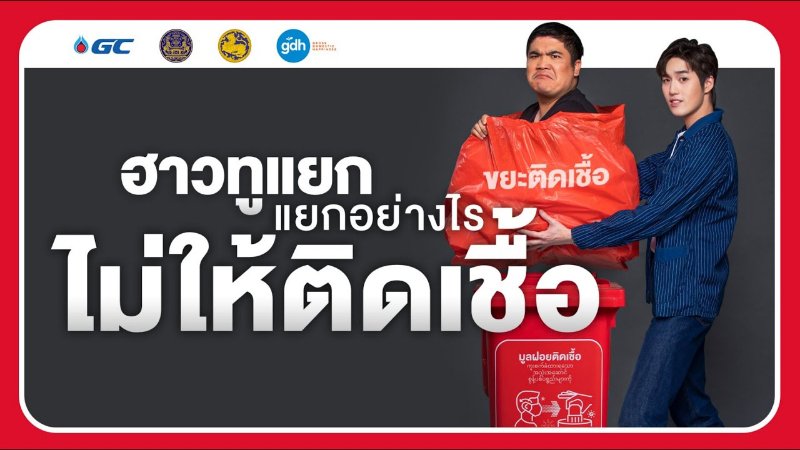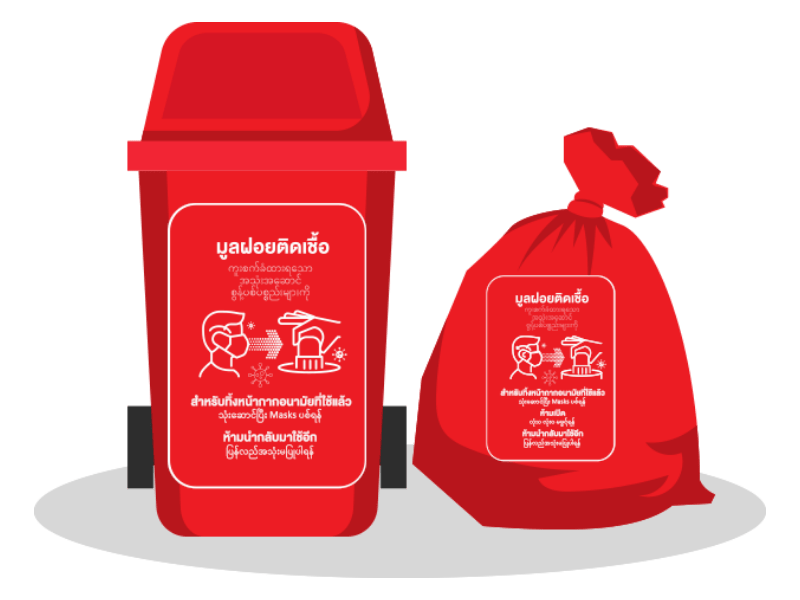The “How to Yeak...How to Manage Infectious Waste” Project
The “How to Yeak...How to Manage Infectious Waste” Project
Tackling and reducing the spread of pathogens.
The improper disposal of used face masks can lead to the spread of pathogens. To prioritize sanitation and the health of Thais, GC teamed up with the Office of the Prime Minister, Ministry of Interior, and GDH to develop public relations materials as part of the ‘How to Yeak… How to Manage Infectious Waste’ project to increase awareness on proper separation and management of infectious waste along with providing red garbage bags for collection and hands-free red trash bins to prevent the spread of pathogens.
Keeping yourself and your family safe during the new wave of COVID-19 infections involves wearing a face mask, washing your hands frequently and complying with social distancing practices, all of which are precautionary measures that everyone should follow. In the meantime, discarding surgical masks, paper, gloves and personal protective equipment (PPE) is resulting in an increased quantity of infectious waste. It’s important, therefore, to have proper infectious waste management practices to prevent the spread and contamination of waste which can impact communities, garbage collectors and waste disposal sites leading to the spread of infectious waste in public places, rivers and canals, and eventually wider areas.
GC, a Thai company pioneering sustainability, initiated the “How to Yeak… How to Manage Infectious Waste” project. Working with public agencies and partners, the project is providing a better understanding of proper and integrated waste separation and management from the source to end points. This coincides with providing red waste bags for infectious waste made by InnoPlus, GC’s premium quality plastic which is durable, tough, and moisture resistant, providing the perfect option to prevent the spread of pathogens, safety when collecting waste, together with a carbon footprint certification. In addition, hands-free red trash bins were provided which reduce direct contact preventing the spread of pathogens. Their large size, 120-liter capacity, make them suitable for use in higher risk areas, contributing to improved infectious waste management practices.


GC partnered with the Office the Prime Minister, Ministry of the Interior and GDH, a company that produces public relations materials for the media, to launch the “How to Yeak… How to Manage Infectious Waste” project
in provinces with higher risks of spreading COVID-19 – which include Samut Sakorn, Chonburi, and Rayong. Prime Minister Prayuth Chan-ocha presided over the opening ceremony while Tor – Thanapop Leeratanakajorn and Jack - Chaleumpol Tikumpornteerawong, who represent the new generation, encouraged Thais to recognize and pay attention to sorting infectious waste.
GC also donated 35,000 waste bags and 300 red waste bins to the Office of the Prime Minister and Ministry of the Interior. The company also provided 15,000 red waste bags and 150 red waste bins to local municipal agencies in Rayong province to collect infectious waste. The red bins and bags are also labeled in the Burmese language to reach migrant workers from Myanmar who are a major target group.
Furthermore, GC and Thai Union, a sustainability partner, teamed up to build a better understanding about infectious waste separation in Samut Sakorn province through a program operated by a private company as part of the project’s implementation making it a pilot province using a practical approach.
Proper disposal of face masks involves taking-off the mask without touching the inside or outside. Fold the mask on the side that touches the face and then cut the straps. Then, dispose of the mask in the provided red waste bag and tie it tightly. Write ‘infectious waste’ on the bag or dump it in the red waste bin provided. Then, wash your hands thoroughly with soap.

GC is confident in our mission to create ‘Chemistry for Better Living’ and remains ready to stand side by side with Thais under any circumstances. With the support of our partners, GC is promoting habits that contribute to responsible and sustainable consumption so Thailand can overcome this critical time and transition to a period of normalcy in our daily lives.
Last Update Apr 2021
![GC initiates the ‘How to Yeak: How to manage infectious waste’ project [The Thai Press]](https://sustainability.pttgcgroup.com/storage/newsroom/news/2021/04/20210419-022221-1.jpg)
![How to Yeak: How to manage infectious waste [The Matter]](https://sustainability.pttgcgroup.com/storage/newsroom/featured-stories/2021/04/20210419-240221-1.jpg)
























